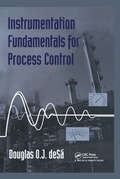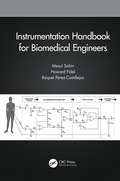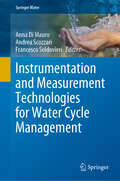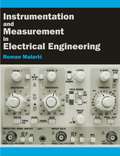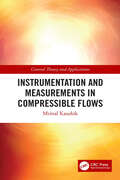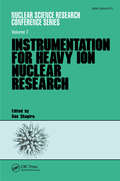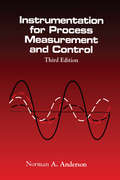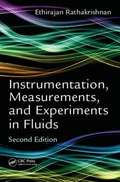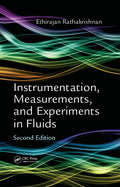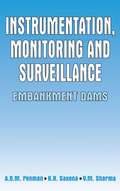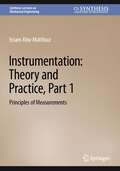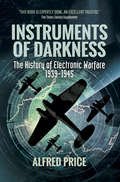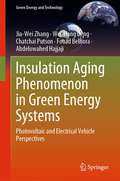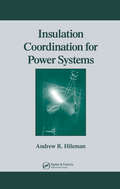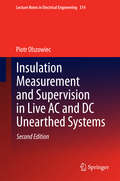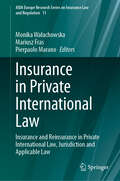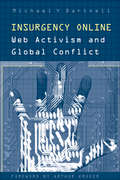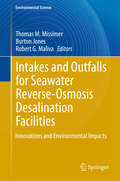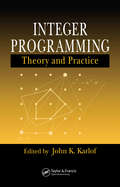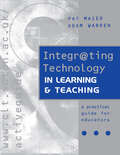- Table View
- List View
Instrumentation For A Better Tomorrow: Proceedings Of A Symposium In Honor Of Arnold Beckman
by National Research Council of the National AcademiesOn November 15, 2004, the National Academies sponsored a symposium at the Beckman Center in honor of Arnold O. Beckman. The symposium concentrated on the wide-ranging practical applications of scientific instrumentation as was the focus of much of Arnold Beckman’s career. The report begins with two presentations: a remembrance by Arnold Beckman’s daughter, Pat, and an overview of his life and accomplishments by Arnold Thackray, President of the Chemical Heritage Foundation. The next section contains presentations on the application of instrumentation in seven, diverse areas: organic chemistry, molecular and systems biology, synchrotron x-ray sources, nanoscale chemistry, forensics, and clinical medicine. Finally, there is a summary of a panel discussion on the evolving relationship between instrumentation and research.
Instrumentation Fundamentals for Process Control
by Douglas O. deSaA practical introductory guide to the principles of process measurement and control. Written for those beginning a career in the instrumentation and control industry or those who need a refresher, the book will serve as a text or to supercede the mathematical treatment of control theory that will continue to be essential for a well-rounded understanding. The book will provide the reader with the ability to recognize problems concealed among a mass of data and provide minimal cost solutions, using available technology.
Instrumentation Handbook for Biomedical Engineers
by Mesut SahinThe book fills a void as a textbook with hands-on laboratory exercises designed for biomedical engineering undergraduates in their senior year or the first year of graduate studies specializing in electrical aspects of bioinstrumentation. Each laboratory exercise concentrates on measuring a biophysical or biomedical entity, such as force, blood pressure, temperature, heart rate, respiratory rate, etc., and guides students though all the way from sensor level to data acquisition and analysis on the computer. The book distinguishes itself from others by providing electrical circuits and other measurement setups that have been tested by the authors while teaching undergraduate classes at their home institute over many years. Key Features:• Hands-on laboratory exercises on measurements of biophysical and biomedical variables• Each laboratory exercise is complete by itself and they can be covered in any sequence desired by the instructor during the semester• Electronic equipment and supplies required are typical for biomedical engineering departments • Data collected by undergraduate students and data analysis results are provided as samples• Additional information and references are included for preparing a report or further reading at the end of each chapter Students using this book are expected to have basic knowledge of electrical circuits and troubleshooting. Practical information on circuit components, basic laboratory equipment, and circuit troubleshooting is also provided in the first chapter of the book.
Instrumentation and Measurement Technologies for Water Cycle Management (Springer Water)
by Andrea Scozzari Francesco Soldovieri Anna Di MauroThis book aims at presenting a unified framework for the description of working principles, recent advances and applications of cutting-edge measurement technologies for the water sector. Instrumentation and measurement technologies are currently playing a key role in the monitoring, assessment and protection of environmental resources. Measurement techniques and sensing methods for the observation of water systems are rapidly evolving and are requiring an increased multi-disciplinary participation.The whole water sector is characterised by multiple technological contexts concerning the monitoring of the resource, given the broad coverage that includes water from its natural domains to the men-made infrastructures. In particular, instrumentation and measurement technologies have a pervasive presence in all the necessary aspects for the assessment, monitoring and control of the water resource and of its relationship with the various environmental stressors, including the anthropic pressures.Therefore, the book aims at presenting how the diagnostics/monitoring methodologies and the related technologies can give an answer to the issues raised by the complex scenario characterising the water cycle management (WCM). The book is structured in five topical sections, grouped by similarity of their technological and/or applicative contexts.
Instrumentation and Measurement in Electrical Engineering
by Roman MalaricThe inclusion of an electrical measurement course in the undergraduate curriculum of electrical engineering is important in forming the technical and scientific knowledge of future electrical engineers. This book explains the basic measurement techniques, instruments, and methods used in everyday practice. It covers in detail both analogue and digital instruments, measurements errors and uncertainty, instrument transformers, bridges, amplifiers, oscilloscopes, data acquisition, sensors, instrument controls and measurement systems. The reader will learn how to apply the most appropriate measurement method and instrument for a particular application, and how to assemble the measurement system from physical quantity to the digital data in a computer. The book is primarily intended to cover all necessary topics of instrumentation and measurement for students of electrical engineering, but can also serve as a reference for engineers and practitioners to expand or refresh their knowledge in this field.
Instrumentation and Measurements in Compressible Flows (Control Theory and Applications)
by Mrinal KaushikInstrumentation and Measurements in Compressible Flows presents detailed information on experiments in compressible fluid flows including technical information pertaining to a wide variety of applications and the experimental basis for compressible flows. A step-by-step procedure is given to estimate the measurement errors as well as the uncertainty. Computational fluid dynamics data can be validated with the experimental results presented in the book. Further, it answers most pertinent queries related to conducting experiments and measuring the data at very high speeds. This volume also includes MATLAB® programs for selected topics. Features: Presents detailed coverage of instrumentation, measurements, and experiments in compressible flows Covers both experimental and applied aspects of gas dynamics Provides a real-time exposure to the modern supersonic and hypersonic wind tunnel applications Explains supersonic and hypersonic shock/boundary-layer interactions and their control Includes real-time experimental problems and their analysis This book is aimed at researchers and graduate students in aerospace and mechanical engineering.
Instrumentation for Heavy Ion Nuclear Research
by Dan ShapiraReflecting the recent innovations in heavy ion detection systems, this volume presents the state of the art in these systems and discusses plans and techniques for new instrumentation to explore the newest frontier of heavy ion science - relativistic heavy ions. Topics covered include low mass detectors, the GSI magnetic spectrometer, the Berkeley high resolution ball and detectors for high energy heavy ion colliders.
Instrumentation for Process Measurement and Control, Third Editon
by Norman A. AndersonThe perennially bestselling third edition of Norman A. Anderson's Instrumentation for Process Measurement and Control provides an outstanding and practical reference for both students and practitioners. It introduces the fields of process measurement and feedback control and bridges the gap between basic technology and more sophisticated systems. Keeping mathematics to a minimum, the material meets the needs of the instrumentation engineer or technician who must learn how equipment operates. I t covers pneumatic and electronic control systems, actuators and valves, control loop adjustment, combination control systems, and process computers and simulation
Instrumentation, Measurements, and Experiments in Fluids
by Ethirajan RathakrishnanMechanical engineers involved with flow mechanics have long needed an authoritative reference that delves into all the essentials required for experimentation in fluids, a resource that can provide fundamental review, as well as the details necessary for experimentation on everything from household appliances to hi-tech rockets. Instrumentation, Measurements, and Experiments in Fluids meets this challenge, as its author is not only a highly respected pioneer in fluids, but also possesses twenty years experience teaching students of all levels. He clearly explains fundamental principles as well the tools and methods essential for advanced experimentation.Reflecting an awe for flow mechanics, along with a deep-rooted knowledge, the author has assembled a fourteen chapter volume that is destined to become a seminal work in the field. Providing ample detail for self study and the sort of elegant writing rarely found in so thorough a treatment, he provides insight into all the vital topics and issues associated with the devices and instruments used for fluid mechanics and gas dynamics experiments. Extremely organized, this work presents easy access to the principles behind the science and goes on to elucidate the current research and findings needed by those seeking to make further advancement. Unique and Thorough Coverage of Uncertainty AnalysisThe author provides valuable insight into the vital issues associated with the devices used in fluid mechanics and gas dynamics experiments. Leaving nothing to doubt, he tackles the most difficult concepts and ends the book with an introduction to uncertainty analysis.Structured and detailed enough for self study, this volume also provides the backbone for both undergraduate and graduate courses on fluids experimentation.
Instrumentation, Measurements, and Experiments in Fluids, Second Edition
by Ethirajan RathakrishnanInstrumentation, Measurements, and Experiments in Fluids, Second Edition is primarily focused on essentials required for experimentation in fluids, explaining basic principles, and addressing the tools and methods needed for advanced experimentation. It also provides insight into the vital topics and issues associated with the devices and instruments used for fluid mechanics and gas dynamics experiments. The second edition adds exercise problems with answers, along with PIV systems of flow visualization, water flow channel for flow visualization, and pictures with Schlieren and shadowgraph—from which possible quantitative information can be extracted. Ancillary materials include detailed solutions manual and lecture slides for the instructors.
Instrumentation, Monitoring and Surveillance: Embankment Dams
by A.D.M PenmanBesides giving an historical introduction to embankment dams the book describes the need for instrumentation, planning procurement and installation practices of instruments. The significance of visual inspection and techniques, of monitoring various parameters, seepage, pore pressure, surface and internal displacements, earth pressures and seismic behaviour, through instrumentation has been described. Collection and processing of data and their use for back analysis to check stability of a dam at various stages of construction and reservoir filling have been suggested. In addition to case histories quoted in various chapters, an exclusive chapter on select case histories has been added which describes the conventional and latest instruments that are being used and methods adopted for installation, monitoring and analyses of data.
Instrumentation: Principles of Measurements (Synthesis Lectures on Mechanical Engineering)
by Issam Abu-MahfouzThis book emphasizes simple and concise coverage of the fundamental aspects of measuring systems. It is designed to provide the reader with essential knowledge regarding signals, signal analysis, signal conditioning circuits, and data acquisition systems. The prerequisites are a basic knowledge of multivariable calculus, introductory physics, and a familiarity with basic electrical circuits and components. Delivers topics and techniques that are fundamental to the understanding of the measurement process. These include standards, dynamic characteristics of measuring devices, statistical analysis of data, uncertainty analysis, signal conditioning devices, transistors,and logic circuits, analog to digital converters. To aid in the understanding of the subject matter and related applications, the book chapters are complemented with examples and problems. Careful attention was paid to the details of figures and illustration to help enforce the learning objectives of this book.
Instruments of Darkness: The History of Electronic Warfare, 1939–1945
by Alfred PriceThe rapid evolution of radio and radar systems for military use during the Second World War, and devices to counter them, led to a technological battle that neither the Axis nor the Allied powers could afford to lose. The result was a continual series of thrusts, parries and counter-thrusts, as first one side then the other sought to wrest the initiative in the struggle to control the ether. This was a battle fought with strange-sounding weapons: 'Freya', 'Mandrel', 'Boozer' and 'Window'; and was characterised by the bravery, self-sacrifice and skill of those who took part in it. However, for many years the use of electronic-warfare systems during the conflict remained a closely guarded military secret. When that veil of secrecy was finally lifted, the technicalities of the subject meant that it remained beyond the reach of lay researchers and readers. Alfred Price, an aircrew officer with the RAF where he flew with V-Force and specialised in electronic warfare and air fighting tactics, was in the unique position to lift the lid on this largely unexplored aspect of the Second World War. When it was first published in 1967, Instruments of Darkness came to be regarded as a standard reference work on this intriguing subject. This completely revised edition concludes with the Japanese surrender in August 1945 and brings the analysis fully up to date in the light of what we now know. 'This book is expertly done. An excellent treatise.' The Times Literary Supplement
Insulation Aging Phenomenon in Green Energy Systems: Photovoltaic and Electrical Vehicle Perspectives (Green Energy and Technology)
by Jia-Wei Zhang Wei-Hang Deng Chatchai Putson Fouad Belhora Abdelowahed HajjajiThis book is a must-read for those interested in the aging phenomenon of materials used in new energy systems, such as photovoltaic and electric vehicles. It provides a fundamental framework for this topic and important basic data and references for insulation materials used in these systems. It covers the aging of photovoltaic systems installed in different environments, including space, as well as the aging of the discharge present in the drive motors of electric vehicles. This book is suitable for researchers and students interested in green energy systems and can be used for teaching, research, and science popularization.
Insulation Coordination for Power Systems (Power Engineering (Willis) #Vol. 9)
by Andrew R. HilemanThis detailed and comprehensive reference presents the latest developments in power system insulation coordination—emphasizing the achievement of optimum insulation strength at minimum cost. Comprehensively covering a myriad of insulation coordination techniques, the book examines electrical transmission and distribution lines and substations. Supplemented with end-of-chapter problem sets and over 1700 literature citations, tables, drawings, and equations, the book focuses on the conventional (or deterministic) method of insulation coordination, as well as the probabilistic method with its emphasis on statistical analysis.
Insulation Measurement and Supervision in Live AC and DC Unearthed Systems
by Piotr OlszowiecLow voltage unearthed (IT) AC and DC systems are commonly applied for supply of power and control circuits in industry, transportation, medical objects etc. The main reasons for their use are high reliability and numerous advantages offered by isolating them against ground. Insulation level is a decisive factor for networks operational reliability and safety. Insufficient insulation-to-ground resistance can cause various disturbances. Though ground faults in IT systems do not make networks operation impossible, they may cause severe problems with their safe functioning. In this book the most important issues concerning normal operation and ground fault phenomena are described in concise form. Numerous methods of insulation resistance and capacitance measurement in live circuits are presented. Important other procedures of these parameters determination based on measurement and calculation are explained and reviews of selected insulation resistance measurement devices as well as earth fault locating systems are included. This book is addressed to electrical engineers, technicians and students and may also serve as an academic handbook. The extended second edition includes several innovative methods of insulation parameters determination as well as more detailed explanations of procedures and issues. Furthermore new important problems e. g. indirect methods of insulation resistance determination and insulation resistance monitoring in networks with frequency converters are addressed as well as examples of practical applications.
Insurance in Private International Law: Insurance and Reinsurance in Private International Law, Jurisdiction and Applicable Law (AIDA Europe Research Series on Insurance Law and Regulation #11)
by Pierpaolo Marano Monika Wałachowska Mariusz FrasThis book provides a comprehensive analysis of jurisdiction and law applicable in cross-border insurance matters. The first book to address cross-border insurance cases from the perspective of European Union regulations, international conventions, and national laws applicable to insurance and insurance-related issues, it explores the concept of cross-border insurance issues and specific institutions related to insurance matters. In the process, it covers both classic private international law matters and specific issues, such as autonomous vehicles in cross-border cases, new technologies, and the Insurance Distribution Directive (IDD). Given its focus, the book offers a valuable asset for academics, judges, legal practitioners and insurance companies, and other institutions frequently dealing with cross-border insurance matters.
Insurgency Online
by Michael Y. DartnellIn Insurgency Online, Michael Dartnell focuses on a new form of conflict made possible by global communications. The Internet, Dartnell argues, is affecting extensive changes to the way politics are carried out, by inserting a range of non-state actors onto the global political stage. He demonstrates that Web activism raises issues about the organization of societies and the distribution of power and contends that the development of online activism has far-reaching social and political implications, with parallels to the influence of the invention of the printing press, the telegraph, and the radio.Dartnell concentrates on Web activists who use the Net as a media tool, distinguishing this use from information terrorism, which threatens or harasses through 'hacking' or electronic sabotage. Using the examples of the Revolutionary Association of the Women of Afghanistan (RAWA), which opposed the Taliban, the Peruvian Movimento Revolucionario Tupac Amaru (MRTA) and its campaign against the Fujimori government, and the Irish Republican Socialist Movement (IRSM), Dartnell evaluates the political implications and general character of Web activism among non-state actors. Insurgency Online shows that online activism is a ripe, new territory for non-governmental actors to raise awareness and develop support around the world.
Insurgent Democracy: The Nonpartisan League in North American Politics
by Michael J. LansingIn 1915, western farmers mounted one of the most significant challenges to party politics America has seen: the Nonpartisan League, which sought to empower citizens and restrain corporate influence. Before its collapse in the 1920s, the League counted over 250,000 paying members, spread to thirteen states and two Canadian provinces, controlled North Dakota's state government, and birthed new farmer-labor alliances. Yet today it is all but forgotten, neglected even by scholars. Michael J. Lansing aims to change that. Insurgent Democracy offers a new look at the Nonpartisan League and a new way to understand its rise and fall in the United States and Canada. Lansing argues that, rather than a spasm of populist rage that inevitably burned itself out, the story of the League is in fact an instructive example of how popular movements can create lasting change. Depicting the League as a transnational response to economic inequity, Lansing not only resurrects its story of citizen activism, but also allows us to see its potential to inform contemporary movements.
Insurrection (Agent Paul Richter Thriller)
by James BarringtonPaul Richter returns in his most dangerous mission yet.In Syria, a ritualistic ISIS beheading seems like another barbaric part of a terrible war. But this time is different…In London, Paul Richter is briefed about a series of seemingly unconnected events, notably a terrifying spate of seemingly random shootings in America. Something doesn’t quite fit. Before long Richter is on the case and in the line of fire.It seems a plot far bigger than anyone could have imagined is brewing from the mountains of the Hindu Kush and the deserts of Syria to the heart of Middle America.With no information, the clock is ticking for Richter – and millions of innocent lives.For readers of James Patterson, Will Jordan and Chris Ryan, the Agent Paul Richter series is intense, visceral and totally unmissable.
Insurrection (An Agent Paul Richter Thriller)
by James BarringtonPaul Richter returns in his most dangerous mission yet.In Syria, a ritualistic ISIS beheading seems like another barbaric part of a terrible war. But this time is different…In London, Paul Richter is briefed about a series of seemingly unconnected events, notably a terrifying spate of seemingly random shootings in America. Something doesn’t quite fit. Before long Richter is on the case and in the line of fire.It seems a plot far bigger than anyone could have imagined is brewing from the mountains of the Hindu Kush and the deserts of Syria to the heart of Middle America.With no information, the clock is ticking for Richter – and millions of innocent lives.For readers of James Patterson, Will Jordan and Chris Ryan, the Agent Paul Richter series is intense, visceral and totally unmissable.
Insurrection Day: The gripping new Hayley Chill novella
by Chris HautyTHE UPRISING HAS BEGUN Hayley Chill has twenty-four hours to stop a violent revolt. The insurrection, taking the form of a storming of the Capitol Building, appears to be wholly spontaneous and disorganized. But is it? As the situation spirals out of control, authorities on the ground are utterly unprepared to protect the nation's elected representatives from the crowd's vengeance. When Hayley Chill rescues a powerful senator and his staff from the mob&’s clutches, she discovers shocking evidence that the uprising is led by one of the country&’s longstanding adversaries. Non-stop action shifts from Capitol Hill to a pursuit across Washington DC as Hayley chases down foreign operatives to make them answer for their crimes. Partly inspired by true events, this is a blistering novella featuring much-loved series character, Hayley Chill, and her fight against the powerful forces that threaten to overthrow democracy. Praise for Chris Hauty 'Hayley Chill is relentlessly smart and brave in this twisty, electrifying thriller' KARIN SLAUGHTER 'Full of twists, this one will keep you hooked to the very end' JAMES SWALLOW 'One of the most surprising double-reverse plot twists I have seen in some time' NEW YORK TIMES &‘Brilliantly fast-moving and absorbing&’ SUNDAY TIMES CRIME CLUB The HAYLEY CHILL thriller series #1 DEEP STATE #2 SAVAGE ROAD #3 STORM RISING
Intakes and Outfalls for Seawater Reverse-Osmosis Desalination Facilities
by Robert G. Maliva Thomas M. Missimer Burton JonesThe book assembles the latest research on new design techniques in water supplies using desalinated seawater. The authors examine the diverse issues related to the intakes and outfalls of these facilities. They clarify how and why these key components of the facilities impact the cost of operation and subsequently the cost of water supplied to the consumers. The book consists of contributed articles from a number of experts in the field who presented their findings at the "Desalination Intakes and Outfalls" workshop held at King Abdullah University of Science and Technology (KAUST) in Saudi Arabia in October, 2013. The book integrates coverage relevant to a wide variety of researchers and professionals in the general fields of environmental engineering and sustainable development.
Integer Programming: Theory and Practice
by John K. KarlofInteger Programming: Theory and Practice contains refereed articles that explore both theoretical aspects of integer programming as well as major applications. This volume begins with a description of new constructive and iterative search methods for solving the Boolean optimization problem (BOOP). Following a review of recent developments
Integr@ting Technology in Learning and Teaching: A Practical Guide For Educators
by Maier, Pat Warren, Adam (both of the Interactive Learning Centre, Southampton University)This volume looks at the issues involved in integrating new technologies within the education process. It includes activities, case studies and notes for use by all teaching in higher education.

